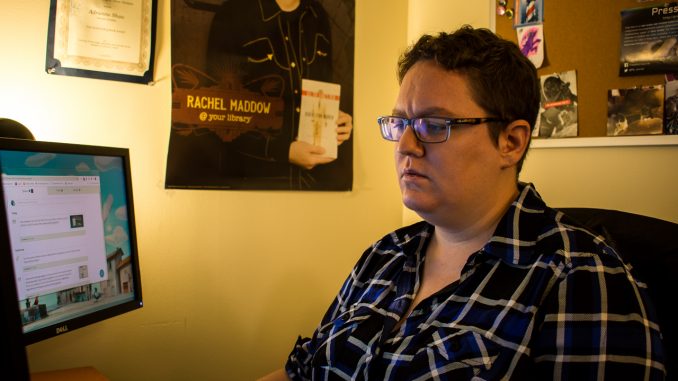
A professor is bringing more than 30 years worth of LGBTQ-themed video games, fan-written game modifications and game developer interviews to a German museum.
Media studies and production professor Adrienne Shaw is co-curating “Rainbow Arcade,” an interactive exhibit showcasing the history of LGBTQ video games. The exhibit will open in December in Berlin at the Schwules Museum, a museum that has highlighted LGBTQ history and culture around the world since it opened in 1985.
“This will not only be the first time they are doing a video game exhibit, but this will also be the first time any museum will do a history of LGBTQ video games exhibit,” said Shaw, who came out as a lesbian in the 1990s.
“Rainbow Arcade” will feature several prominent LGBTQ video games, like mystery video game “Caper in The Castro,” which is recognized as the first LGBTQ-themed video game. The exhibit will be split into six sections, each exploring a different aspect of LGBTQ representation in video games.
The sections will mainly focus on the history of these games and different milestones, like when various game companies included queer characters for the first time.
The exhibit will also explore how game studios and developers cover queer topics in their narratives and games. There will be a section on the community of fans and queer gamers and their experiences of discrimination in gaming spaces.
Attendees can learn about the stories and histories behind the development and narratives of the games through interviews from the games’ designers and developers.
Shaw has studied the representation of marginalized groups in video games for 13 years, with a specific focus on LGBTQ representation.
“When I started back in 2005, it was an area of game studies that nobody was really working on,” Shaw said. “There had been a lot of work done on LGBTQ representation in other media, but just not in games.”
In May 2015, Shaw created The LGBTQ Game Archive, an online curated collection of LGBTQ video games. The archive covers everything from queer characters in games to overt and subtle references embedded in games’ landscapes and stories.
Christopher Persaud, a 2017 sociology and French alumnus, started working as a research assistant for the LGBTQ Game Archive his junior year.
Persaud’s job involved everything from posting in the archive, maintaining the site, referencing and cross-referencing other sources online and verifying the archive’s accuracy. He also watched video game playthroughs and tracked down and read old game manuals.
“It’s just kind of a lot of digging and any game could take anywhere from two hours to 50 hours depending on how complex it was,” Persaud said.
Shaw also published the book “Gaming at the Edge: Sexuality and Gender at the Margins of Gamer Culture,” in 2014. It focuses on marginalized people and groups within the gaming community. It also examines how LGBTQ gamers create spaces outside of the toxic online communities that exist in some gaming subcultures.
Shaw’s commitment to telling these stories and highlighting these games extends into her classes. Junior sociology major Kenny Thach took Shaw’s Spring 2018 LGBT Media Representation class, which inspired them to create the Queer Nerd Association.
QNA is a student organization dedicated to queer students who like video games, comic books and other “nerd” hobbies.
Thach, who came out their junior year and identifies as non-binary, said they could always express themself in video games and used them to discover their identity at a young age.
“Whenever I would play a game, I always played as the female character,” they said. “Or I would make my male character look a lot more ‘girly,’ I guess a lot more gender-fluid.”
For gamers who can’t make it to Berlin for “Rainbow Arcade,” Shaw plans to publish the catalog around March 2019 documenting the exhibit. It will chronicle her work and help gamers learn about LGBTQ representation in video games.
To fund the catalog, Shaw and the Schwules Museum launched a $28,700 ($25,000 euros) fundraising campaign on the crowd-funding website Kickstarter to print and distribute the book. The campaign reached its goal this past week after launching on Sept. 18.
Some of Shaw’s students are excited about the exhibit’s potential.
“It’s validating because it shows that gaming is a valid art form and queer people are allowed to express themselves through gaming,” Thach said.


Be the first to comment